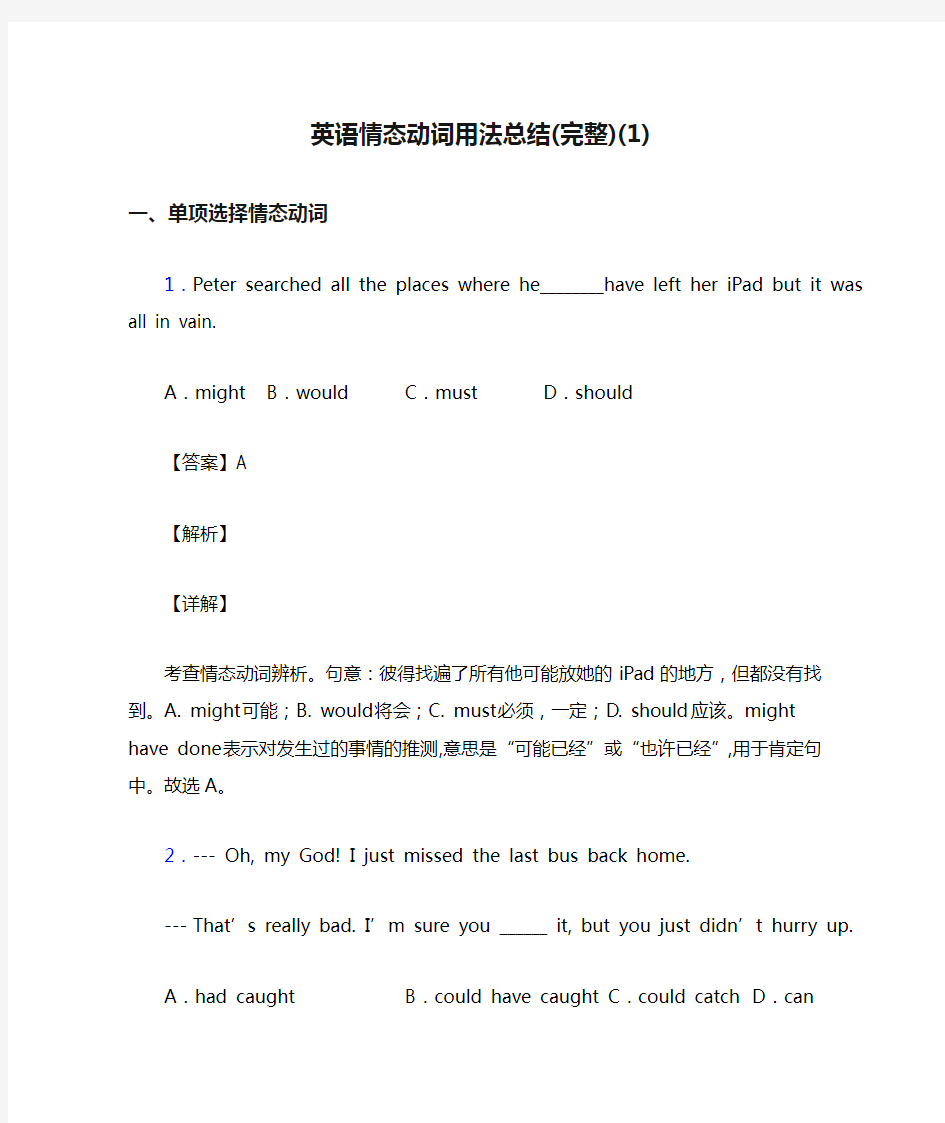- 1、下载文档前请自行甄别文档内容的完整性,平台不提供额外的编辑、内容补充、找答案等附加服务。
- 2、"仅部分预览"的文档,不可在线预览部分如存在完整性等问题,可反馈申请退款(可完整预览的文档不适用该条件!)。
- 3、如文档侵犯您的权益,请联系客服反馈,我们会尽快为您处理(人工客服工作时间:9:00-18:30)。
英语情态动词用法总结(完整)(1)
一、单项选择情态动词
1.Peter searched all the places where he________have left her iPad but it was all in vain.
A.mightB.wouldC.mustD.should
【答案】A
2.--- Oh, my God! I just missed the last bus back home.
--- That’s really bad. I’m sure you ______ it, but you just didn’t hurry up.
A.had caughtB.could have caughtC.could catchD.can catch
13.The principal in our school has recently passed a rule that students _______ wear school uniforms in our campus.
A.mayB.shouldC.willD.shall
【答案】D
【解析】
---No. It was so difficult that he __________have passed it.
A.shouldn'tB.mustn't
C.couldn' tD.wouldn't
【答案】C
【解析】
【详解】
考查情态动词。A. shouldn't不应该;B. mustn't禁止,不允许;C. couldn' t不可能;D. wouldn't不会。句意:---他对结果很满意,是吗? ---不。考试太难了,他不可能通过。固定结构:couldn' t have done“不可能做某事”,此处是对过去事情有把握的否定推测。故选C。
【点睛】
本题是高考必考考点,一定要牢记句型意思。must have done过去肯定做了某事。should have done本应该做而实际未做。can’t have done过去不可能做了某事;shouldn’t have done本不应该做而实际做了。need have done本有必要做某事而没做;needn’t have done本没有必要做某事;注意没有mustn’t have done的形式。
11.-Jenny took the 8:00 bus to Guangzhou this morning.
-Really? He__the 9:00 train. It's much more comfortable and safer to travel by train.
A.could have takenB.should take
A.mightB.must
C.shallD.could
【答案】C
【解析】
【详解】
考查情态动词。句意:未经校长允许,任何学生不得离开学校去吃午饭。might可能;must一定,必须;shall会,将;could能够。本句是一条禁令。shall用于肯定句并且主语是第一、三人称时,表示允诺,警告,劝告等语气。故选C。
12.—It’s so hot and uncomfortable here! Why are your windows still closed?
—Oh, I’m not to blame. They ________ open.
A.shan’tB.mustn’tC.won’tD.wouldn’t
He oughtn't to / shouldn't have done that.他本来就不该做那件事.(可是做了)
6.“would+have+过去分词”表示对过去的某种情况进行猜测,或本来要做某事却因某种原因未做成,通常用来说明某一情况,但不像用should或ought to那样含有责备之意.如:
【答案】C
【解析】
【详解】
考查情态动词辨析。句意:---这里又热又不舒服!你的窗户怎么还关着?---哦,不该责备我啊。窗户打不开了。shan’t= shall not意为“不可,不应”;mustn’t=must not意为“不要”;wouldn't=would not意为“不会,不愿意”。won’t=will not意为“不会,不能”,will在这里表示能力、功能。例如:This auditorium will seat one thousand people.这个礼堂能容纳一千人。这句话意思是“这扇窗不能打开”,故选C项。
9.I still find it hard to imagine that such a clever child __________ make such a foolish mistake.
A.shallB.must
C.canD.should
【答案】D
【解析】
【详解】
考查情态动词。句意:我仍然难以想象这样聪明的孩子竟然犯这样愚蠢的错误。should作为情态动词,可以用来表示意外、惊喜或者在说话人看来是不可思议的,常常译为"竟会"、"居然",这么聪明的孩子竟然犯这样愚蠢的错误。表示意外,shall表示允诺,命令等,must表示必须,can表示能力及可能性。所以答案选D。
8.I love the weekend, because I ________ get up early on Saturdays and Sundays.
A.mustn’tB.needn’t
C.wouldn’tD.shouldn’t
【答案】B
【解析】
【详解】
考查情态动词。句意:我喜欢周末,因为周六周日不必早起。A. mustn’t不能,禁止;B. needn’t不必;C. wouldn’t不会;D. shouldn’t不应该。此处表示“不必”,故B项正确。
A.willB.need
C.canD.源自文库ust
【答案】D
【解析】
【详解】
考查情态动词表推测。句意:房间如此干净,他一定是昨天晚上打扫过了。must have done表示对过去发生的事情有把握的猜测,意思是“一定(做过)”,故D项正确。
5.---He was satisfied with the result, wasn't he?
I guess the poet would have been about twenty when she wrote her first poem.
Another worker wouldn't have acted like that.
6.Lack of sleep _______ lead to weakened immunity and memory, and also slow physical growth.
A.shallB.mustC.shouldD.can
【答案】D
【解析】
【详解】
考查情态动词辨析。句意:睡眠不足会导致免疫力和记忆力下降,还会减缓身体发育。A. shall将;B. must必须;C. should应该;D. can会,表示理论上或是逻辑判断上,用can,故选D。
7.No student ________ go out of school to have lunch without permission of the headteacher.
【点睛】
情态动词shall的用法:
1、在主语是第一、三人称的疑问句中征求对方意见:要不要……?……好吗?如:Shall we go?该走了吧?
2、用于二、三人称,在陈述句中表示说话者给对方的承诺、决心、警告、威胁等。如:You shall borrow the book。你可以借这本书。
A.shallB.should
C.canD.must
【答案】C
【解析】
【详解】
考查情态动词辨析。句意:他是个脾气不好的家伙,但当他希望自己有魅力的时候,他可以变得相当可爱。此处表示“能、可以”,故C项正确。
4.The room is so clean. He ________ have cleaned it yesterday evening.
【解析】
【详解】
考查虚拟语气中的情态动词。句意:真遗憾啊!考虑到他的能力和经验,他也许可以做得更好。can have done较少使用此结构,表示对过去行为的怀疑;用于疑问句时意为“难道真的做了吗”,表示怀疑;need have done需要做某事,实际上却未做(表示虚拟语气);must have done一定做了某事(表示对过去发生的事情的肯定推测);might have done表示对发生过的事情的推测,意思是“可能已经”或“也许已经”,用于肯定句中。故D正确。
5.“should / ought to + have +过去分词”表示过去本该做某事但没做,其否定式表示过去不该做某事但做了,这种句式含有不满或责备之意,ought to的语气比should强一些.如:
You ought to / should have studied harder.你本应该更努力学习的.(但没有)
【解析】
【详解】
考查情态动词辨析。句意:彼得找遍了所有他可能放她的iPad的地方,但都没有找到。A. might可能;B. would将会;C. must必须,一定;D. should应该。might have done表示对发生过的事情的推测,意思是“可能已经”或“也许已经”,用于肯定句中。故选A。
【点睛】
情态动词+ have done结构:
1.“must + have +过去分词”表示对过去发生的事情或状态进行推测,语气比较坚定,通常只用于肯定句.如:It must have rained last night,for the ground is wet.
2.“can / could + have +过去分词”表示对过去某种情况的怀疑或不确定.can和could一般用于否定句和疑问句,could的语气较can弱.如:He can't have finished the work so soon.
10.What a pity! Considering his ability and experience, he ___________ it better.
A.need have doneB.must have done
C.can have doneD.might have done
【答案】D
【详解】
考查情态动词。句意:我们学校的校长最近通过了一项规定,要求学生在校园里穿校服。分析句子可知,“that students _______ wear school uniforms in our campus.”是同位语从句对名词“rule”内容解释说明。当表示强制,用于法令、条约、规章中,意为“必须,应该”等时句子用情态动词shall。故选D。
3.“may / might + have +过去分词”表示对已发生的动作或存在的状态进行不肯定的推测,might的语气比may弱一点.这种结构主要用于肯定句和否定句,疑问句改用can或could.如:They may not have known it beforehand.
4.“need + have +过去分词”表示过去做了不必做或不需要做的事情,或过去做某事纯属多余.如:I needn't have bought so much wine—only five people came.
【答案】B
【解析】
【详解】
考查情态动词+have done结构。句意:——哦,我的上帝!我刚好错过了回家的末班车。——这是非常糟糕的。我肯定你能赶上,但你就是不抓紧。could have done“本来能做而没有做”。故选B。
3.He is a bad-tempered fellow, but he ________ be quite charming when he wishes.
C.must have takenD.can take
【答案】A
【解析】
【详解】
考查情态动词。句意:Jenny今天早上坐8:00的客车去广州了。真的吗?她本能够坐9:00火车的,乘火车去旅游更安全舒适。情态动词加have done表示对过去的猜测,A.表本可能做了某事;B.表应该做某事;C.表过去一定做了某事D.可能,能够做某事。根据句意,此处是对过去的虚拟,故选A。


